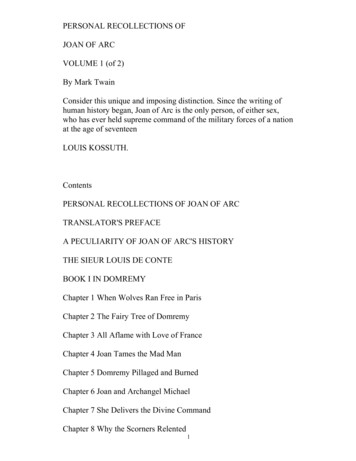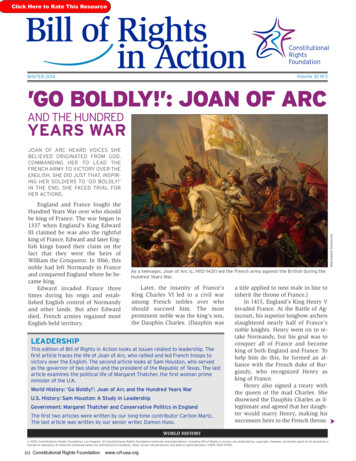
Transcription
PERSONAL RECOLLECTIONS OFJOAN OF ARCVOLUME 1 (of 2)By Mark TwainConsider this unique and imposing distinction. Since the writing ofhuman history began, Joan of Arc is the only person, of either sex,who has ever held supreme command of the military forces of a nationat the age of seventeenLOUIS KOSSUTH.ContentsPERSONAL RECOLLECTIONS OF JOAN OF ARCTRANSLATOR'S PREFACEA PECULIARITY OF JOAN OF ARC'S HISTORYTHE SIEUR LOUIS DE CONTEBOOK I IN DOMREMYChapter 1 When Wolves Ran Free in ParisChapter 2 The Fairy Tree of DomremyChapter 3 All Aflame with Love of FranceChapter 4 Joan Tames the Mad ManChapter 5 Domremy Pillaged and BurnedChapter 6 Joan and Archangel MichaelChapter 7 She Delivers the Divine CommandChapter 8 Why the Scorners Relented1
BOOK II IN COURT AND CAMPChapter 1 Joan Says Good-ByChapter 2 The Governor Speeds JoanChapter 3 The Paladin Groans and BoastsChapter 4 Joan Leads Us Through the EnemyChapter 5 We Pierce the Last AmbuscadesChapter 6 Joan Convinces the KingChapter 7 Our Paladin in His GloryChapter 8 Joan Persuades Her InquisitorsChapter 9 She Is Made General-in-ChiefChapter 10 The Maid's Sword and BannerChapter 11 The War March Is BegunChapter 12 Joan Puts Heart in Her ArmyChapter 13 Checked by the Folly of the WiseChapter 14 What the English AnsweredChapter 15 My Exquisite Poem Goes to SmashChapter 16 The Finding of the DwarfChapter 17 Sweet Fruit of Bitter TruthChapter 18 Joan's First Battle-FieldChapter 19 We Burst In Upon GhostsChapter 20 Joan Makes Cowards Brave VictorsChapter 21 She Gently Reproves Her Dear Friend2
Chapter 22 The Fate of France DecidedChapter 23 Joan Inspires the Tawdry KingChapter 24 Tinsel Trappings of NobilityChapter 25 At Last—Forward!Chapter 26 The Last Doubts ScatteredChapter 27 How Joan Took JargeauPERSONAL RECOLLECTIONS OF JOAN OF ARCBy The Sieur Louis De Conte(her page and secretary)In Two VolumesVolume 1.Freely translated out of the ancient French into modern English fromthe original unpublished manuscript in the National Archives ofFranceBy Jean Francois AldenAuthorities examined in verification of the truthfulness of thisnarrative:J. E. J. QUICHERAT, Condamnation et Rehabilitation de Jeanned'Arc. J. FABRE, Proces de Condamnation de Jeanne d'Arc. H. A.WALLON, Jeanne d'Arc. M. SEPET, Jeanne d'Arc. J. MICHELET,Jeanne d'Arc. BERRIAT DE SAINT-PRIX, La Famille de Jeanned'Arc. La Comtesse A. DE CHABANNES, La Vierge Lorraine.Monseigneur RICARD, Jeanne d'Arc la Venerable. Lord RONALDGOWER, F.S.A., Joan of Arc. JOHN O'HAGAN, Joan of Arc.JANET TUCKEY, Joan of Arc the Maid.3
TRANSLATOR'S PREFACETo arrive at a just estimate of a renowned man's character one mustjudge it by the standards of his time, not ours. Judged by the standardsof one century, the noblest characters of an earlier one lose much oftheir luster; judged by the standards of to-day, there is probably noillustrious man of four or five centuries ago whose character couldmeet the test at all points. But the character of Joan of Arc is unique.It can be measured by the standards of all times without misgiving orapprehension as to the result. Judged by any of them, it is stillflawless, it is still ideally perfect; it still occupies the loftiest placepossible to human attainment, a loftier one than has been reached byany other mere mortal.When we reflect that her century was the brutalest, the wickedest, therottenest in history since the darkest ages, we are lost in wonder at themiracle of such a product from such a soil. The contrast between herand her century is the contrast between day and night. She wastruthful when lying was the common speech of men; she was honestwhen honesty was become a lost virtue; she was a keeper of promiseswhen the keeping of a promise was expected of no one; she gave hergreat mind to great thoughts and great purposes when other greatminds wasted themselves upon pretty fancies or upon poor ambitions;she was modest, and fine, and delicate when to be loud and coarsemight be said to be universal; she was full of pity when a mercilesscruelty was the rule; she was steadfast when stability was unknown,and honorable in an age which had forgotten what honor was; she wasa rock of convictions in a time when men believed in nothing andscoffed at all things; she was unfailingly true to an age that was falseto the core; she maintained her personal dignity unimpaired in an ageof fawnings and servilities; she was of a dauntless courage when hopeand courage had perished in the hearts of her nation; she wasspotlessly pure in mind and body when society in the highest placeswas foul in both—she was all these things in an age when crime wasthe common business of lords and princes, and when the highestpersonages in Christendom were able to astonish even that infamousera and make it stand aghast at the spectacle of their atrocious livesblack with unimaginable treacheries, butcheries, and beastialities.She was perhaps the only entirely unselfish person whose name has aplace in profane history. No vestige or suggestion of self-seeking can4
be found in any word or deed of hers. When she had rescued her Kingfrom his vagabondage, and set his crown upon his head, she wasoffered rewards and honors, but she refused them all, and would takenothing. All she would take for herself—if the King would grant it—was leave to go back to her village home, and tend her sheep again,and feel her mother's arms about her, and be her housemaid andhelper. The selfishness of this unspoiled general of victorious armies,companion of princes, and idol of an applauding and grateful nation,reached but that far and no farther.The work wrought by Joan of Arc may fairly be regarded as rankingany recorded in history, when one considers the conditions underwhich it was undertaken, the obstacles in the way, and the means ather disposal. Caesar carried conquests far, but he did it with thetrained and confident veterans of Rome, and was a trained soldierhimself; and Napoleon swept away the disciplined armies of Europe,but he also was a trained soldier, and he began his work with patriotbattalions inflamed and inspired by the miracle-working new breath ofLiberty breathed upon them by the Revolution—eager youngapprentices to the splendid trade of war, not old and broken men-atarms, despairing survivors of an age-long accumulation ofmonotonous defeats; but Joan of Arc, a mere child in years, ignorant,unlettered, a poor village girl unknown and without influence, found agreat nation lying in chains, helpless and hopeless under an aliendomination, its treasury bankrupt, its soldiers disheartened anddispersed, all spirit torpid, all courage dead in the hearts of the peoplethrough long years of foreign and domestic outrage and oppression,their King cowed, resigned to its fate, and preparing to fly the country;and she laid her hand upon this nation, this corpse, and it rose andfollowed her. She led it from victory to victory, she turned back thetide of the Hundred Years' War, she fatally crippled the Englishpower, and died with the earned title of DELIVERER OF FRANCE,which she bears to this day.And for all reward, the French King, whom she had crowned, stoodsupine and indifferent, while French priests took the noble child, themost innocent, the most lovely, the most adorable the ages haveproduced, and burned her alive at the stake.A PECULIARITY OF JOAN OF ARC'S HISTORY5
The details of the life of Joan of Arc form a biography which isunique among the world's biographies in one respect: It is the onlystory of a human life which comes to us under oath, the only onewhich comes to us from the witness-stand. The official records of theGreat Trial of 1431, and of the Process of Rehabilitation of a quarterof a century later, are still preserved in the National Archives ofFrance, and they furnish with remarkable fullness the facts of her life.The history of no other life of that remote time is known with eitherthe certainty or the comprehensiveness that attaches to hers.The Sieur Louis de Conte is faithful to her official history in hisPersonal Recollections, and thus far his trustworthiness isunimpeachable; but his mass of added particulars must depend forcredit upon his word alone.THE TRANSLATOR.THE SIEUR LOUIS DE CONTETo his Great-Great-Grand Nephews and NiecesThis is the year 1492. I am eighty-two years of age. The things I amgoing to tell you are things which I saw myself as a child and as ayouth.In all the tales and songs and histories of Joan of Arc, which you andthe rest of the world read and sing and study in the books wrought inthe late invented art of printing, mention is made of me, the SieurLouis de Conte—I was her page and secretary, I was with her fromthe beginning until the end.I was reared in the same village with her. I played with her every day,when we were little children together, just as you play with yourmates. Now that we perceive how great she was, now that her namefills the whole world, it seems strange that what I am saying is true;for it is as if a perishable paltry candle should speak of the eternal sunriding in the heavens and say, "He was gossip and housemate to mewhen we were candles together." And yet it is true, just as I say. I washer playmate, and I fought at her side in the wars; to this day I carry inmy mind, fine and clear, the picture of that dear little figure, withbreast bent to the flying horse's neck, charging at the head of the6
armies of France, her hair streaming back, her silver mail plowingsteadily deeper and deeper into the thick of the battle, sometimesnearly drowned from sight by tossing heads of horses, uplifted swordarms, wind-blow plumes, and intercepting shields. I was with her tothe end; and when that black day came whose accusing shadow willlie always upon the memory of the mitered French slaves of Englandwho were her assassins, and upon France who stood idle and essayedno rescue, my hand was the last she touched in life.As the years and the decades drifted by, and the spectacle of themarvelous child's meteor flight across the war firmament of Franceand its extinction in the smoke-clouds of the stake receded deeper anddeeper into the past and grew ever more strange, and wonderful, anddivine, and pathetic, I came to comprehend and recognize her at lastfor what she was—the most noble life that was ever born into thisworld save only One.BOOK I IN DOMREMYChapter 1 When Wolves Ran Free in ParisI, THE SIEUR LOUIS DE CONTE, was born in Neufchateau, on the6th of January, 1410; that is to say, exactly two years before Joan ofArc was born in Domremy. My family had fled to those distantregions from the neighborhood of Paris in the first years of thecentury. In politics they were Armagnacs—patriots; they were for ourown French King, crazy and impotent as he was. The Burgundianparty, who were for the English, had stripped them, and done it well.They took everything but my father's small nobility, and when hereached Neufchateau he reached it in poverty and with a broken spirit.But the political atmosphere there was the sort he liked, and that wassomething. He came to a region of comparative quiet; he left behindhim a region peopled with furies, madmen, devils, where slaughterwas a daily pastime and no man's life safe for a moment. In Paris,mobs roared through the streets nightly, sacking, burning, killing,unmolested, uninterrupted. The sun rose upon wrecked and smokingbuildings, and upon mutilated corpses lying here, there, and yonderabout the streets, just as they fell, and stripped naked by thieves, the7
unholy gleaners after the mob. None had the courage to gather thesedead for burial; they were left there to rot and create plagues.And plagues they did create. Epidemics swept away the people likeflies, and the burials were conducted secretly and by night, for publicfunerals were not allowed, lest the revelation of the magnitude of theplague's work unman the people and plunge them into despair. Thencame, finally, the bitterest winter which had visited France in fivehundred years. Famine, pestilence, slaughter, ice, snow—Paris had allthese at once. The dead lay in heaps about the streets, and wolvesentered the city in daylight and devoured them.Ah, France had fallen low—so low! For more than three quarters of acentury the English fangs had been bedded in her flesh, and so cowedhad her armies become by ceaseless rout and defeat that it was saidand accepted that the mere sight of an English army was sufficient toput a French one to flight.When I was five years old the prodigious disaster of Agincourt fellupon France; and although the English King went home to enjoy hisglory, he left the country prostrate and a prey to roving bands of FreeCompanions in the service of the Burgundian party, and one of thesebands came raiding through Neufchateau one night, and by the light ofour burning roof-thatch I saw all that were dear to me in this world(save an elder brother, your ancestor, left behind with the court)butchered while they begged for mercy, and heard the butchers laughat their prayers and mimic their pleadings. I was overlooked, andescaped without hurt. When the savages were gone I crept out andcried the night away watching the burning houses; and I was all alone,except for the company of the dead and the wounded, for the rest hadtaken flight and hidden themselves.I was sent to Domremy, to the priest, whose housekeeper became aloving mother to me. The priest, in the course of time, taught me toread and write, and he and I were the only persons in the village whopossessed this learning.At the time that the house of this good priest, Guillaume Fronte,became my home, I was six years old. We lived close by the villagechurch, and the small garden of Joan's parents was behind the church.As to that family there were Jacques d'Arc the father, his wife IsabelRomee; three sons—Jacques, ten years old, Pierre, eight, and Jean,seven; Joan, four, and her baby sister Catherine, about a year old. Ihad these children for playmates from the beginning. I had some other8
playmates besides—particularly four boys: Pierre Morel, EtienneRoze, Noel Rainguesson, and Edmond Aubrey, whose father wasmaire at that time; also two girls, about Joan's age, who by and bybecame her favorites; one was named Haumetter, the other was calledLittle Mengette. These girls were common peasant children, like Joanherself. When they grew up, both married common laborers. Theirestate was lowly enough, you see; yet a time came, many years after,when no passing stranger, howsoever great he might be, failed to goand pay his reverence to those two humble old women who had beenhonored in their youth by the friendship of Joan of Arc.These were all good children, just of the ordinary peasant type; notbright, of course—you would not expect that—but good-hearted andcompanionable, obedient to their parents and the priest; and as theygrew up they became properly stocked with narrowness andprejudices got at second hand from their elders, and adopted withoutreserve; and without examination also—which goes without saying.Their religion was inherited, their politics the same. John Huss and hissort might find fault with the Church, in Domremy it disturbednobody's faith; and when the split came, when I was fourteen, and wehad three Popes at once, nobody in Domremy was worried about howto choose among them—the Pope of Rome was the right one, a Popeoutside of Rome was no Pope at all. Every human creature in thevillage was an Armagnac—a patriot—and if we children hotly hatednothing else in the world, we did certainly hate the English andBurgundian name and polity in that way.Chapter 2 The Fairy Tree of DomremyOUR DOMREMY was like any other humble little hamlet of thatremote time and region. It was a maze of crooked, narrow lanes andalleys shaded and sheltered by the overhanging thatch roofs of thebarnlike houses. The houses were dimly lighted by wooden-shutteredwindows—that is, holes in the walls which served for windows. Thefloors were dirt, and there was very little furniture. Sheep and cattlegrazing was the main industry; all the young folks tended flocks.The situation was beautiful. From one edge of the village a floweryplain extended in a wide sweep to the river—the Meuse; from the rearedge of the village a grassy slope rose gradually, and at the top was9
the great oak forest—a forest that was deep and gloomy and dense,and full of interest for us children, for many murders had been done init by outlaws in old times, and in still earlier times prodigious dragonsthat spouted fire and poisonous vapors from their nostrils had theirhomes in there. In fact, one was still living in there in our own time. Itwas as long as a tree, and had a body as big around as a tierce, andscales like overlapping great tiles, and deep ruby eyes as large as acavalier's hat, and an anchor-fluke on its tail as big as I don't knowwhat, but very big, even unusually so for a dragon, as everybody saidwho knew about dragons. It was thought that this dragon was of abrilliant blue color, with gold mottlings, but no one had ever seen it,therefore this was not known to be so, it was only an opinion. It wasnot my opinion; I think there is no sense in forming an opinion whenthere is no evidence to form it on. If you build a person without anybones in him he may look fair enough to the eye, but he will be limberand cannot stand up; and I consider that evidence is the bones of anopinion. But I will take up this matter more at large at another time,and try to make the justness of my position appear. As to that dragon,I always held the belief that its color was gold and without blue, forthat has always been the color of dragons. That this dragon lay but alittle way within the wood at one time is shown by the fact that PierreMorel was in there one day and smelt it, and recognized it by thesmell. It gives one a horrid idea of how near to us the deadliest dangercan be and we not suspect it.In the earliest times a hundred knights from many remote places in theearth would have gone in there one after another, to kill the dragonand get the reward, but in our time that method had gone out, and thepriest had become the one that abolished dragons. Pere GuillaumeFronte did it in this case. He had a procession, with candles andincense and banners, and marched around the edge of the wood andexorcised the dragon, and it was never heard of again, although it wasthe opinion of many that the smell never wholly passed away. Not thatany had ever smelt the smell again, for none had; it was only anopinion, like that other—and lacked bones, you see. I know that thecreature was there before the exorcism, but whether it was thereafterward or not is a thing which I cannot be so positive about.In a noble open space carpeted with grass on the high ground towardVaucouleurs stood a most majestic beech tree with wide-reachingarms and a grand spread of shade, and by it a limpid spring of coldwater; and on summer days the children went there—oh, everysummer for more than five hundred years—went there and sang anddanced around the tree for hours together, refreshing themselves at the10
spring from time to time, and it was most lovely and enjoyable. Alsothey made wreaths of flowers and hung them upon the tree and aboutthe spring to please the fairies that lived there; for they liked that,being idle innocent little creatures, as all fairies are, and fond ofanything delicate and pretty like wild flowers put together in that way.And in return for this attention the fairies did any friendly thing theycould for the children, such as keeping the spring always full and clearand cold, and driving away serpents and insects that sting; and sothere was never any unkindness between the fairies and the childrenduring more than five hundred years—tradition said a thousand—butonly the warmest affection and the most perfect trust and confidence;and whenever a child died the fairies mourned just as that child'splaymates did, and the sign of it was there to see; for before the dawnon the day of the funeral they hung a little immortelle over the placewhere that child was used to sit under the tree. I know this to be trueby my own eyes; it is not hearsay. And the reason it was known thatthe fairies did it was this—that it was made all of black flowers of asort not known in France anywhere.Now from time immemorial all children reared in Domremy werecalled the Children of the Tree; and they loved that name, for itcarried with it a mystic privilege not granted to any others of thechildren of this world. Which was this: whenever one of these came todie, then beyond the vague and formless images drifting through hisdarkening mind rose soft and rich and fair a vision of the Tree—if allwas well with his soul. That was what some said. Others said thevision came in two ways: once as a warning, one or two years inadvance of death, when the soul was the captive of sin, and then theTree appeared in its desolate winter aspect—then that soul wassmitten with an awful fear. If repentance came, and purity of life, thevision came again, this time summer-clad and beautiful; but if it wereotherwise with that soul the vision was withheld, and it passed fromlife knowing its doom. Still others said that the vision came but once,and then only to the sinless dying forlorn in distant lands and pitifullylonging for some last dear reminder of their home. And what reminderof it could go to their hearts like the picture of the Tree that was thedarling of their love and the comrade of their joys and comforter oftheir small griefs all through the divine days of their vanished youth?Now the several traditions were as I have said, some believing oneand some another. One of them I knew to be the truth, and that wasthe last one. I do not say anything against the others; I think they weretrue, but I only know that the last one was; and it is my thought that ifone keep to the things he knows, and not trouble about the things11
which he cannot be sure about, he will have the steadier mind for it—and there is profit in that. I know that when the Children of the Treedie in a far land, then—if they be at peace with God—they turn theirlonging eyes toward home, and there, far-shining, as through a rift in acloud that curtains heaven, they see the soft picture of the Fairy Tree,clothed in a dream of golden light; and they see the bloomy meadsloping away to the river, and to their perishing nostrils is blown faintand sweet the fragrance of the flowers of home. And then the visionfades and passes—but they know, they know! and by theirtransfigured faces you know also, you who stand looking on; yes, youknow the message that has come, and that it has come from heaven.Joan and I believed alike about this matter. But Pierre Morel andJacques d'Arc, and many others believed that the vision appearedtwice—to a sinner. In fact, they and many others said they knew it.Probably because their fathers had known it and had told them; forone gets most things at second hand in this world.Now one thing that does make it quite likely that there were really twoapparitions of the Tree is this fact: From the most ancient times if onesaw a villager of ours with his face ash-white and rigid with a ghastlyfright, it was common for every one to whisper to his neighbor, "Ah,he is in sin, and has got his warning." And the neighbor wouldshudder at the thought and whisper back, "Yes, poor soul, he has seenthe Tree."Such evidences as these have their weight; they are not to be put asidewith a wave of the hand. A thing that is backed by the cumulativeevidence of centuries naturally gets nearer and nearer to being proofall the time; and if this continue and continue, it will some daybecome authority—and authority is a bedded rock, and will abide.In my long life I have seen several cases where the tree appearedannouncing a death which was still far away; but in none of these wasthe person in a state of sin. No; the apparition was in these cases onlya special grace; in place of deferring the tidings of that soul'sredemption till the day of death, the apparition brought them longbefore, and with them peace—peace that might no more bedisturbed—the eternal peace of God. I myself, old and broken, waitwith serenity; for I have seen the vision of the Tree. I have seen it, andam content.Always, from the remotest times, when the children joined hands anddanced around the Fairy Tree they sang a song which was the Tree's12
song, the song of L'Arbre fee de Bourlemont. They sang it to a quaintsweet air—a solacing sweet air which has gone murmuring throughmy dreaming spirit all my life when I was weary and troubled, restingme and carrying me through night and distance home again. Nostranger can know or feel what that song has been, through thedrifting centuries, to exiled Children of the Tree, homeless and heavyof heart in countries foreign to their speech and ways. You will thinkit a simple thing, that song, and poor, perchance; but if you willremember what it was to us, and what it brought before our eyes whenit floated through our memories, then you will respect it. And you willunderstand how the water wells up in our eyes and makes all thingsdim, and our voices break and we cannot sing the last lines:"And when, in Exile wand'ring, we Shall fainting yearn for glimpse ofthee, Oh, rise upon our sight!"And you will remember that Joan of Arc sang this song with usaround the Tree when she was a little child, and always loved it. Andthat hallows it, yes, you will grant that:L'ARBRE FEE DE BOURLEMONTSONG OF THE CHILDRENNow what has kept your leaves so green, Arbre Fee de Bourlemont?The children's tears! They brought each grief, And you did comfortthem and cheer Their bruised hearts, and steal a tear That, healed,rose a leaf.And what has built you up so strong, Arbre Fee de Bourlemont?The children's love! They've loved you long Ten hundred years, insooth, They've nourished you with praise and song, And warmedyour heart and kept it young— A thousand years of youth!Bide always green in our young hearts, Arbre Fee de Bourlemont!And we shall always youthful be, Not heeding Time his flight; Andwhen, in exile wand'ring, we Shall fainting yearn for glimpse of thee,Oh, rise upon our sight!The fairies were still there when we were children, but we never sawthem; because, a hundred years before that, the priest of Domremyhad held a religious function under the tree and denounced them as13
being blood-kin to the Fiend and barred them from redemption; andthen he warned them never to show themselves again, nor hang anymore immortelles, on pain of perpetual banishment from that parish.All the children pleaded for the fairies, and said they were their goodfriends and dear to them and never did them any harm, but the priestwould not listen, and said it was sin and shame to have such friends.The children mourned and could not be comforted; and they made anagreement among themselves that they would always continue to hangflower-wreaths on the tree as a perpetual sign to the fairies that theywere still loved and remembered, though lost to sight.But late one night a great misfortune befell. Edmond Aubrey's motherpassed by the Tree, and the fairies were stealing a dance, not thinkinganybody was by; and they were so busy, and so intoxicated with thewild happiness of it, and with the bumpers of dew sharpened up withhoney which they had been drinking, that they noticed nothing; soDame Aubrey stood there astonished and admiring, and saw the littlefantastic atoms holding hands, as many as three hundred of them,tearing around in a great ring half as big as an ordinary bedroom, andleaning away back and spreading their mouths with laughter and song,which she could hear quite distinctly, and kicking their legs up asmuch as three inches from the ground in perfect abandon andhilarity—oh, the very maddest and witchingest dance the woman eversaw.But in about a minute or two minutes the poor little ruined creaturesdiscovered her. They burst out in one heartbreaking squeak of griefand terror and fled every which way, with their wee hazel-nut fists intheir eyes and crying; and so disappeared.The heartless woman—no, the foolish woman; she was not heartless,but only thoughtless—went straight home and told the neighbors allabout it, whilst we, the small friends of the fairies, were asleep and notwitting the calamity that was come upon us, and all unconscious thatwe ought to be up and trying to stop these fatal tongues. In themorning everybody knew, and the disaster was complete, for whereeverybody knows a thing the priest knows it, of course. We all flockedto Pere Fronte, crying and begging—and he had to cry, too, seeing oursorrow, for he had a most kind and gentle nature; and he did not wantto banish the fairies, and said so; but said he had no choice, for it hadbeen decreed that if they ever revealed themselves to man again, theymust go. This all happened at the worst time possible, for Joan of Arcwas ill of a fever and out of her head, and what could we do who had14
not her gifts of reasoning and persuasion? We flew in a swarm to herbed and cried out, "Joan, wake! Wake, there is no moment to lose!Come and plead for the fairies—come and save them; only you can doit!"But her mind was wandering, she did not know what we said nor whatwe meant; so we went away knowing all was lost. Yes, all was lost,forever lost; the faithful friends of the children for five hundred yearsmust go, and never come back any more.It was a bitter day for us, that day that Pere Fronte held the functionunder the tree and banished the fairies. We could not wear mourningthat any could have noticed, it would not have been allowed; so wehad to be content with some poor small rag of black tied upon ourgarments where it made no show; but in our hearts we woremourning, big and noble and occupying all the room, for our heartswere ours; they could not get at them to prevent that.The great tr
PERSONAL RECOLLECTIONS OF JOAN OF ARC VOLUME 1 (of 2) By Mark Twain Consider this unique and imposing distinction. Since the writing of human history began, Joan of Arc is the only person, of either sex, who has ever held supreme command of the military forces of a nation










